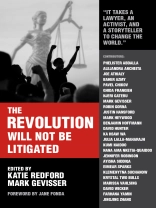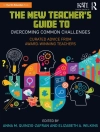Written from the maxim “it takes a lawyer, an activist, and a storyteller to change the world’, The Revolution Will Not Be Litigated shows how the law and social movements can reinforce each other in the struggle for justice and freedom.
In these vibrant narratives, 25 of the world’s most accomplished movement lawyers and activists become storytellers, reflecting on their experiences at the frontlines of some of the most significant struggles of our time. In an era where human rights are under threat, their words offer both an inspiration and a compass for the way movements can use the law – and must sometimes break it – to bring about social justice.
The contributors here take you into their worlds: Jennifer Robinson frantically orchestrating a protest outside London’s Ecuadorean embassy to prevent the authorities from arresting her client Julian Assange; Justin Hansford at the barricades during the protests over the murder of Black teenager Mike Brown in Ferguson, Missouri; Ghida Frangieh in Lebanon’s detention centres trying to access arrested protestors during the 2019 revolution; Pavel Chikov defending Pussy Riot and other abused prisoners in Russia; Ayisha Siddiqa, a shy Pakistani immigrant, discovering community in her new home while leading the 2019 youth climate strike in Manhattan; Greenpeace activist Kumi Naidoo on a rubber dinghy in stormy Arctic seas contemplating his mortality as he races to occupy an oil rig.
The stories in The Revolution Will Not Be Litigated capture the complex, and often-awkward dance between legal reform and social change. They are more than compelling portraits of fascinating lives and work, they are revelatory: of generational transitions; of epochal change and apocalyptic anxiety; of the ethical dilemmas that define our age; and of how one can make a positive impact when the odds are stacked against you in a harsh world of climate crisis and ruthless globalization.
Contributors: Phelister Abdalla, Alejandra Ancheita, Joe Athialy, Baher Azmy, Pavel Chikov, Ghida Frangieh, Njeri Gateru, Mark Gevisser, Robin Gorna, Justin Hansford, Mark Heywood, Benjamin Hoffman, David Hunter, Ka Hsaw Wa, Julia Lalla-Maharajh, Kumi Naidoo, Nana Ama Nketia-Quaidoo, Katie Redford, Jennifer Robinson, Ayisha Siddiqa, Eimear Sparks, Klementyna Suchanov, Marissa Vahlsing, Krystal Two Bulls, David Wicker, Farhana Yamin and Jing Jing Zhang.
İçerik tablosu
Some Personal Reflections on People-Power and Legal Power: A Foreword, by Jane Fonda
“It Takes A Lawyer, an Activist and a Storyteller”: An Introduction to this book, by Mark Gevisser
Case Study – Human Rights: Doe vs Unocal
The Activist’s Perspective: The Revolution will not be Litigated, by Ka Hsaw Wa
The Lawyer’s Perspective: It’s All About Power, by Katie Redford
Lawyers on People Power
Lawyering, Leadership and Learning Lessons: My Journey in the Black Lives Matter Movement, by Justin Hansford
Who Owns The Streets?: The roots of the Movement for Black Lives in New York City’s ‘Stop and Frisk’ Case, by Baher Azmy
Five Ways a Legal Strategy Can Help a Movement, by Baher Azmy
‘The Law is Too Important to be Left in the Hands of Lawyers Alone’: Protecting Detainees during the Lebanese Uprising, by Ghida Frangieh
From police torture to surveillance: What it means to be a “human rights lawyer” in Putin’s Russia, Pavel Chikov in conversation with Mark Gevisser
Law, Information and Power: On Being Julian Assange’s Lawyer, by Jennifer Robinson
Building Spaces of Hope: Working for Indigenous Peoples’ Rights in Mexico, by Alejandra Ancheita
The River Brings Oil: Working for Indigenous Peoples’ Rights in the Peruvian Amazon, by Marissa Vahlsing and Benjamin Hoffman
The Path to Legal Empowerment: Holding China accountable for environmental pollution at home and abroad, by Jing Jing Zhang.
The Decriminalisation of Homosexuality in Kenya, Njeri Gateru in conversation with Mark Gevisser.
Case Study – Financial Accountability : The World Bank
The Activist’s Perspective: From Narmada to Tata Mundra in India, by Joe Athialy
The Lawyer’s Perspective: Narrative Justice in the Global Financial Accountability Movement, by David Hunter
Activists on Legal Power
Jonny and Me: Three Decades of Debating ‘The Power of Law’ and ‘The Power of People’ with Jonathan Cooper OBE, by Robin Gorna
Learning from the South African AIDS Treatment Action Campaign: Rethinking law’s relationship with social justice movements, by Mark Heywood
She Would Have Reproductive Justice”: A Story from Ireland’s Movement to Repeal the 8th Amendment – and the Ongoing Fight, by Eimear Sparks.
The Rule of Law vs Poland’s Repressive ‘Law and Justice’ Regime, Klementyna Suchanow in conversation with Eimear Sparks
Ending Female Genital Cutting: What About the Law?, by Julia Lalla-Maharajh OBE
Law and Stones: Sex Workers’ Rights in Kenya, by Phelister Abdalla
A Community, its Abusive Chief, and the Role of the Law: The Story of Nwoase in Ghana, by Nana Ama Nketia-Quaidoo
Standing Up At Standing Rock: An Indigenous Warrior’s Experience, Krystal Two Bulls in conversation with Mark Gevisser and Katie Redford
Case Study – Climate Emergency
The Lawyer’s Perspective: Why the Climate Emergency Needs Lawyers to Break the Law, by Farhana Yamin
The Veteran Activist’s Perspective: From Racial apartheid to Climate apartheid, Kumi Naidoo in conversation with Mark Gevisser
The Youth Activist’s Perspective: On Being a Young Brown Woman on the Frontline, by Ayisha Siddiqa
The Conversation: The Youth Climate Justice Movement, David Wicker and others.
Rules for Radical Lawyers
Rules for Radical Lawyers: A Practical Primer, by Katie Redford
From IRAC to VISTA, by Katie Redford
Yazar hakkında
Mark Gevisser is one of South Africa’s foremost authors and journalists. His books include The Pink Line: Journeys Across the World’s Queer Frontiers; Lost and Found in Johannesburg; and the award-winning A Legacy of Liberation: Thabo Mbeki and the Future of South Africa’s Dream. His journalism and criticism has been published widely, in The New York Times, The New York Review of Books, The Guardian, Granta, and many other publications
Katie Redford is a lawyer with expertise in human rights, climate change and corporate accountability. She is executive director of the Equation Campaign, which confronts the climate crisis by “supporting movements on the ground to keep fossil fuels in the ground.” She was a co-founder and director of Earth Rights International, where she oversaw litigation, training and campaigns programs to hold corporations and other perpetrators legally accountable for human rights and environmental abuses worldwide.












